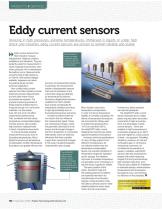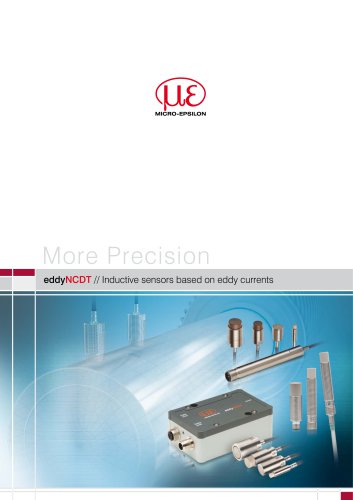
Catalog excerpts

PRODUCTS & SERVICES Eddy current sensors from Micro-Epsilon measure displacement, distance, position, oscillations and vibrations. They are perfectly suited for measurement in harsh industrial environments, even where pressure, dirt or temperature fluctuations occur. Measurements are performed at high speed up to 100kHz. With several designs available, engineers can select the optimal sensor for their particular application. Non-contact eddy current sensors from Micro-Epsilon provide extremely precise measurements and are used where micron accuracies are required. The physical measuring principle of these systems enables them to measure through non-conductive materials. For this reason, dust, dirt and oil do not affect measurement performance. This, combined with the robust, temperature-compensated design of these sensors, also enables high-precision measurements in harsh, industrial environments. To ensure the best possible measurement accuracy even in fluctuating temperatures, MicroEpsilon’s sensors are temperature-compensated. Ambient temperature fluctuations can greatly influence the Micro-Epsilon's sensors provide maximum signal stability thanks to active temperature compensation accuracy of measurement results. In particular, the measurement results of displacement sensors that work at resolutions in the micrometer range are affected by temperature fluctuations. Numerous displacement sensors available from Micro-Epsilon thus actively compensate for tempera:ure, therefore providing a high signal stability even in fluctuating temperature scenarios. In these conditions there are two factors that can influence the measurement signal. These are mechanical changes, where the geometric dimensions of the sensor and the target change in the form of extension or contraction. Alternatively, there are electrical influences that have a greater impact than mechanical changes. In this case, the electromagnetic characteristics also change. Micro-Epsilon uses active temperature compensation in order to improve temperature stability. In complex processes, the effects of temperature fluctuations are accounted for. Being used in ambient temperatures from -40°C to more than 200°C, the eddyNCDT eddy current displacement sensors are robust against temperature fluctuations. However, technical specifications of many of these systems from different manufacturers, do not indicate whether they are temperature compensated. Specs only provide indications of temperature ranges for operation and/or storage. It is therefore important to consider temperature compensation and, if necessary, to ask the sensor supplier for details. The exact position of the piston, the piston rings and the existing pressure conditions are essential information for manufacturers of combustion engines. Using simulation tools, this data is primarily used to make reliable predictions about wear, friction and oil consumption. Furthermore, failure analyses can also be developed. The eddyNCDT eddy current sensor measures the so-called piston ring and piston secondary movements at high accuracies. Here, the advantages of eddy current sensors - which are resistant to high temperatures in combustion engines (up to 180°C and even higher for a short period of time) - are apparent. Prevailing vibrations, pressure, oil, fuel and combustion gas, or continuous mechanical movement, do not influence the precision of results. In addition, eddyNCDT sensors offer fast measurement speeds with small measuring ranges (0-0.5mm) and extremely high resolution (less than 1pm). They are also suitable for installation in restricted spaces, where extreme temperatures and temperature fluctuations occur, and will have no influence on the periphery. @ FREE READER INQUIRY SERVICE To learn more about Micro-Epsilon, visit: www.ukipme.com/info/etm 102 // September 2016 // Engine Technology lnternational.com
Open the catalog to page 1All Micro-epsilon catalogs and technical brochures
-
wireSENSOR
60 Pages
-
NCDT 3001
7 Pages
-
eddyNCDT 3005
5 Pages
-
NCDT 3070
7 Pages
-
NCDT 3060
9 Pages
-
Non-contact sensors
1 Pages
-
P60 analog
19 Pages
-
wire SENSOR MPM analog
9 Pages
-
wire SENSOR MT
8 Pages
-
WDS-2500-P85
2 Pages
-
Wire SENSOR
18 Pages
-
wireSENSOR WPS-K100
2 Pages
-
SurfaceCONTROL
12 Pages
-
scanCONTROL
32 Pages
-
optoNCDT
40 Pages



























